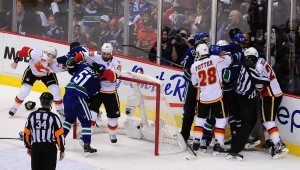Throughout the regular season, and throughout the last few years, the Calgary Flames have never really seemed to have good luck playing against the Vancouver Canucks. Their biggest Canadian rival in the West, the two teams have always been on a different level. The Canucks have been constant playoff contenders, making it all the way to the Stanley Cup finals in 2010. Whereas the Flames have constantly been missing the playoffs since 2009, not good enough to make it in but not bad enough to secure a top pick in the draft lottery.
As (Canadian) fate would have it, the Canucks and Flames were slated to meet in the first round of the 2015 Stanley Cup Playoffs. There would be no shortage of competition and bad blood in this series, and definitely no shortage of pressure on the 8th seed Flames.
If history and statistics were to dictate the outcome of this series, the Vancouver Canucks would easily take it. And the Flames were slated to go down the same route as last season’s Colorado Avalanche. Sure, they made it, partly out of hard work and perseverance, and partly out of sheer luck. But their cup run would last one round, and the following season would see them right back in a struggling rebuild mode.
The Canucks’ home ice advantage was a serious deterrent to the Flames’ good start to the series (or so everybody thought), and following a scoreless first period in which the Flames found themselves playing short-handed twice, and a second period in which 20-year old Bo Horvat scored his very first career playoff goal, Rogers Arena was roaring with anticipation of a win.
However, the Flames didn’t let their one-goal deficit affect their third period play. In fact, like the have all regular season, they thrived on it. Just shy of the halfway mark of the final frame, David Jones tied it up with a wrister, assisted by Michael Ferland.
Both goalies proved to be fantastic, calm in the eye of the storm, and stopping 30 shots on goal each.
And just when fans in the arena had settled down for an extra period of playoff hockey, Flames defenseman Kris Russell said no. With 30 seconds to go in regulation.
Thankfully, no riots erupted in Vancouver, a city known for its rowdy hockey fans (although there were several fan altercations between rival fans, as to be expected). Surprising pretty much anyone who had a slight or vested interested in this series, the Calgary Flames took Game 1 in Vancouver.

Game 2 was a different story. Once again, the Canucks drew first blood, from a wrister by Daniel Sedin just three minutes into the game. And this time, instead of resting on the one-goal lead, the boys in blue built on it. With Dennis Wideman in the box for a delay of game, Chris Higgins shot one past Jonas Hiller to double the lead.
Although the Flames outshot the Canucks 11-9 in the second, neither team could beat the opposing goalie, and to start the third, the Flames were still down by two.
Unfortunately for Calgary fans, the third-period-Flames were a no-show that night, as the next goal once again came from the home team, minutes into the final period. It wasn’t until the 16:26 mark that the Flames finally got on the scoreboard. A powerplay goal by Kris Russell spoiled Eddie Lack’s bid for a playoff shutout.
But that was the Flames’ one and only goal, and after pulling Karri Ramo (who had replaced Jonas Hiller to start the third period), and they saw themselves fall behind to 4-1 after a Canucks empty netter.
Although the game was steadily dominated throughout by Vancouver, it certainly was not a boring one. In fact, of the entire series, it was probably the most…interesting.
With frustrations mounting from their three-goal deficit, the Flames allowed the bad blood to boil against their long-time rivals. Michael Ferland certainly managed to get under the skin of many of the Vancouver players, and (not surprisingly) Alexandre Burrowes played the role of agitator to a perfect tee.
The result? 21 penalties in the third period, numerous individual scraps and one big brawl in the last few minutes of the game, and a particularly memorable fight in which Deryk Engelland not only fought two Canucks at once, but successfully won the fight too.
After a 4-1 loss and a $50,000 fine to coach Bob Hartley, the Flames headed home with the split, and a plan to redeem themselves.

During the last week of the regular season, there was much speculation as to whether the Flames’ 2014 draft pick Sam Bennett would make an appearance in the postseason. Young and just freshly recovered from an injury, Calgary’s assistant general manager Craig Conroy appeared to be squelching these rumours by describing Bennett’s naivete and clear inexperience in situations of high pressure on big ice.
Yet here he was in Game 3, not only playing alongside other playoff virgins like Sean Monahan, Johnny Gaudreau and Michael Ferland, but picking up his very first NHL playoff goal as well.
Unwilling to let the previous game rattle them, the Flames opened up the intense C of Red playing much better than they had in Game 2. Fewer turnovers, more puck possession, more discipline.
Brandon Bollig was the first to light the lamp, six minutes into the game, but was quickly answered back by Vancouver’s Shawn Matthias. Shortly after, the Flames regained the lead with a slapper by TJ Brodie, assisted by David Schlemko and Mikael Backlund.
There were only ten shots on goal in the second period (6 for Vancouver and 4 for Calgary), but none resulted in the puck to the back of the net. The Flames started the third up 2-1, and, determined not to let Canucks pull a comeback of their own, made sure to pad their lead.
Denied on his first try to beat Eddie Lack, Sam Bennett managed to scope out the loose puck amidst a slew of bodies and slip it past the Vancouver goalie. Bennett’s goal made him the second-youngest Flames player to score a playoff goal (Jarome Iginla did it when he was six days younger than Bennett is now).
With just over five minutes left in the third, another young Flame to recently catch up to an Iginla achievement, widened the lead to 4-1. Sean Monahan’s powerplay goal at 14:36 was his first of the postseason, but certainly not his last.
The Canucks’ Jannik Hansen was able to cut the Flames’ lead in half, but it was too little, too late for the visitors, as the Flames took a dominating Game 3 win at home.
Their second home game did not disappoint, and as the momentum and confidence grew in their young team, so did the atmosphere of the legendary Red Mile.
Johnny Hockey took this opportunity to score his own first career playoff goal. It came on a Flames powerplay after a boarding call to Vancouver’s Ronalds Kenins. Two more powerplay goals ensued in the first period, courtesy of Henrik Sedin and Jiri Hudler. And to round out the first twenty minutes, Sam Bennett added a second goal to his NHL playoff repertoire.
All of the scoring excitement happened and ceased within the first period, and for the next forty, not one puck could find its way to the back of the net. Jonas Hiller made a whopping 43 saves to stymie the Canucks at one goal and allow his teammates to maintain their 3-1 lead.
The Flames wrapped up a successful two-game home stand with back-to-back wins, and a 3-1 stranglehold on the series.
Only one win was needed for the Flames to advance to second round of the playoffs but it would be a daunting task back at Rogers Arena in Vancouver.
The Canucks decided to put on their playoff pants and played their best game of the series thus far, avoiding elimination at home. Although David Jones put Calgary on the board first, it was the visiting team’s lone goal, happening early in the first period.
In the second, Nick Bonino tied it up, and the Canucks came at Jonas Hiller with a barrage of shots (17 to Calgary’s 8). And in the third, the Canucks outshot Calgary once again, and scored again, this time by Daniel Sedin. Although Hiller once again made a solid 43 saves throughout the night, the Flames’ offense was just not there, and the Canucks lived to see Game 6 back in Cowtown.

Series-wise, there wasn’t much seen of the Cardiac Kids, as the Flames had steadily kept the lead. But game-wise, they were out in full force, with another chance to eliminate the Canucks, this time at home in the Saddledome.
It looked extremely bleak to start, with three unanswered goals in the first period by the Canucks’ Brandon McMillan, Jannik Hansen and Radim Vrbata. And this was all within a ten-minute time span.
But Michael Ferland, the 23-year old winger who has proved to be an integral part of the Flames’ roster this series, took it upon himself to get his struggling team rolling. With less than three minutes left in the third, Ferland’s tip-in gave the Flames a much-needed confidence boost before heading to the locker room to regroup during the first intermission.
Ferland’s goal, and whatever motivational speeches were given in the Flames’ locker room during that intermission, certainly seemed to have an impact on the Comeback Kids. One minute into the second, Sean Monahan nabbed his second of the series, followed by Johnny Gaudreau’s second, which had the game all tied up at three.
Weary of their notorious come-from-behind wins, the Canucks made an effort not to fall behind too early, and Lucas Sbisa’s goal and the halfway mark of the period gave Vancouver the lead once again before the second closed out.
What happened in the third period could not have been predicted by fans or analysts, let alone the stunned Vancouver team.
An extremely costly interference call to Brandon McMillan against Dennis Wideman gave the Flames the chance to tie the game once again. And they did, thanks to Jiri Hudler. And then Matt Stajan decided there was no better time to score his first goal of the playoffs than right then. The go-ahead goal provided Calgary with a burst of energy and a sort of desperation that helped them hold on to their lead.
Then with less than a minute left to go in regulation, and the Canucks’ goalie benched in an attempt to force overtime, not one but two empty-netters happened.
And just like he started the game for the Flames, Michael Ferland ended it, with his empty-netter bringing the final score to 7-4 in favour of the home team.
If there could ever be a perfect definition of the term “Cardiac Kids,” Game 6 was it. Erasing a 3-goal deficit to win the game 7-4, and the series 4-2 put the Flames forefront and centre for most exciting game of the playoffs in Round 1.
The Calgary Flames barely managed to sneak into the postseason, young, green and wide-eyed to the labours and intensity of playoff hockey. Yet they held their own against a postseason constant, and even embarrassed them at times. More unlikely heroes stepped up, and Michael Ferland is now a fan favourite and a household name in every Calgary home.
The Red Mile got to experience its first advancement to the second round in almost a decade.
And as we say this, happy with the successes and surprises brought to us by the Calgary Flames, it’s almost impossible to count them out in the next round, even against the Ducks and the notorious Anaheim curse that has rendered them winless in the Honda Center for years. Yet, as they have proven over and over and over again, the Calgary Flames are not to be underestimated. They may very well take the second round by storm and graduate from Comeback Kids to Comeback Kings.